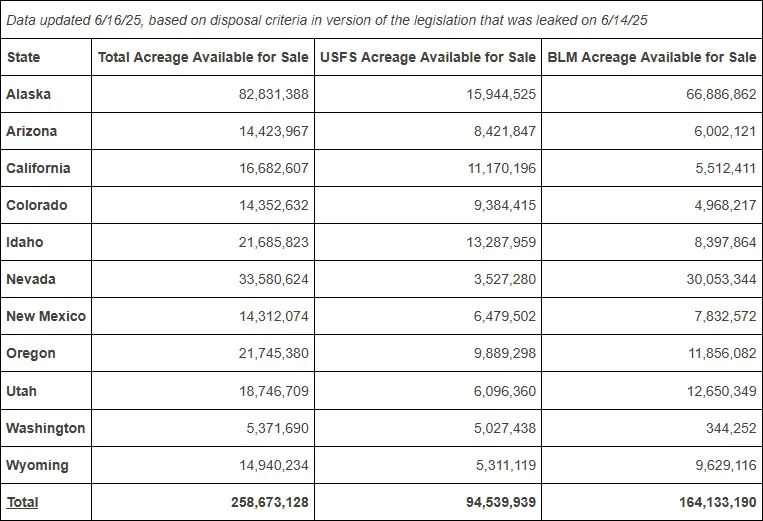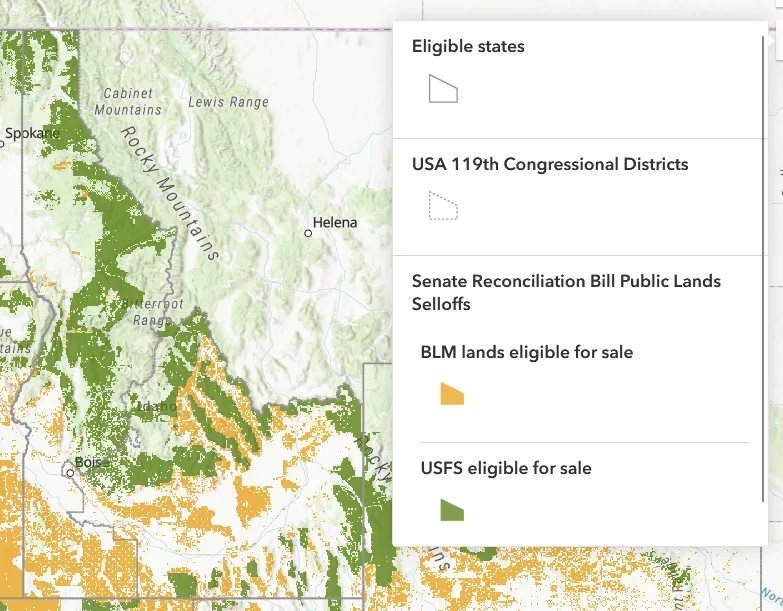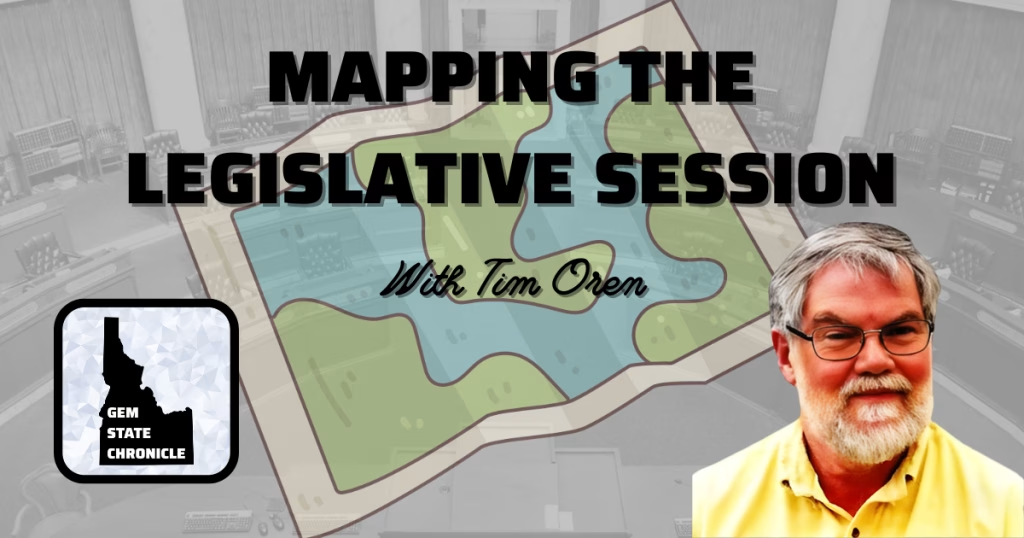The issue of public lands has been debated for many years. Last fall, I wrote about the ongoing debate of whether to leave federally owned public lands as they are, or work to bring them under state control. One of the primary objections to state control was the concern that Idaho and other western states might sell public lands to private developers, depriving millions of people access to wilderness areas where they have hiked, hunted, fished, and grazed for generations.
However, a new wrinkle has emerged. Sen. Mike Lee of Utah is promoting an amendment to H.R. 1, the One Big Beautiful Bill, that would make millions of acres of federally owned public land eligible for sale. According to an analysis by the Wilderness Society, quoted in this article at Meateater, the amendment would require the federal government to sell up to 0.75% of land managed by the National Forest Service (NFS) and Bureau of Land Management (BLM) across eleven western states:
The bill states that land managers are supposed to prioritize parcels that are suitable for housing, but it adds a number of loopholes that would allow officials to sell any of the acres identified on the map above.
For example, the bill requires officials to prioritize lands that are nominated by a state or local government, are adjacent to developed areas, have access to existing infrastructure, and are suitable for residential housing. But at the bottom of that list, it also adds lands that would “reduce checkerboard land patterns” or “are isolated tracts that are inefficient to manage.”
The bill does not explain what it means by “isolated” or “inefficient,” which would give officials latitude to sell virtually any acreage that is not one of the above designations or operating under an existing lease or permit.
According to the Wilderness Society’s analysis, here are the number of acres that could be up for sale if the amendment passes:

The Society published an interactive map showing what land could be made available for sale. This is what Idaho looks like:

In a previous article, Meateater author Jordan Sillars pointed out that Montana was missing from the list of potential sales. He theorized that this could be due to Sen. Lee needing to bring Montana’s congressional delegation on board:
We reached out to Senator Lee’s office for an explanation, but the omission could be a kind of peace offering to Sens. Steve Daines and Tim Sheehy. Both senators have publicly opposed public land sales, with a spokesperson for Sen. Daines telling us previously that he “always and will always oppose the sale of public lands.”
By keeping Montana off his list, Sen. Lee could be hoping to secure support from Montana’s delegation.
Of course, Sens. Daines and Sheehy aren’t the only ones who will have to eventually sign off on this legislation. Even if it passes the Senate, it will still have to pass the House, where the Public Land Caucus includes at least 16 members from both sides of the aisle.
These representatives, like Reps. Ryan Zinke, Mike Simpson, Troy Downing, and Gabe Vasquez, have also vowed to support public lands. Rep. Zinke in particular spearheaded the effort to remove a public land sale provision from the House version of the bill. Public land advocates are urging supporters to contact these members to encourage them to stand strong and maintain their previous position.
Lee has defended his amendment on Twitter this week:
The legislation specifically exempts National Parks, National Monuments, Wilderness Areas, National Recreation Areas, and eleven other categories of federally protected land from sales to build much-needed housing for American families.
Of course, this begs the question: do we really need to turn public lands into affordable housing?
Jonathan Keeperman, aka Lomez, posted an insightful analysis on Twitter this morning:
This plan to sell off public lands is a terrible proposal that doesn’t make any sense under our present circumstances and would be a colossal political blunder, but I will try to be fair to @BasedMikeLee and at least explain where this is all coming from.
Selling off public lands in the west is an old idea on the right and became a point of special interest in the late 70s and early 80s. Look up the Sagebrush Rebellion.
In short, Orrin Hatch led efforts out of Utah to transfer federal land to states and private holders throughout the western states, mostly for grazing and mining. This was all part of the larger anti-fed, small government for small government’s sake, anti-EPA sentiment that prevailed during the Reagan years. Western ranchers and their Republican states—remember even California was a Republican state then—didn’t like the idea of DC bureaucrats telling them what they could and couldn’t do in their own backyards. Fine.
But that was a different time. Much different priorities. Much different demographics. Much different needs.
Lee is obviously drafting off his state’s legacy on this issue but this current proposal has badly misread the current lay of the land.
You could plausibly defend targeted land swaps or narrow leases for ranchers or even mining in places where it makes sense. It’s a completely different thing to propose selling off our country’s pristine western landscape for… “affordable housing.” What?
Affordable housing is a fake and indefensible justification that, if it’s not a cover for more sinister motivations, gives the impression of more sinister motivations. This has all been very poorly messaged and poorly conceived and is a crystal clear example of where older GOP ideas are mismatched with the political desires of young people on the right. Our public lands are one of the last holdouts against the slopification of our country and our lives more broadly. This is not something to toy around with as part of some libertarian/boomer con point-scoring exercise.
This needs to be reworked. This is political poison, and even under the most charitable reading provides only marginal short-term benefit.
Don’t do this!
Twitter personality Mike Cernovich warned against selling our birthright as Americans:
Selling off our federal lands should be a no-go. We haven’t even done mass deportations. Men better than any of us died exploring these areas. They are the birthright of Americans. Selling them off for a bowl of stew would be heresy.
Last fall, Rep. Heather Scott wrote an op-ed in support of Utah’s lawsuit, which made the case that it is unconstitutional for the federal government to own massive tracts of land within western states. The Supreme Court declined to hear the case earlier this year, but Utah Gov. Spencer Cox vowed to continue the fight for state sovereignty.
As I’m sure you’ve gathered by now, there are two competing arguments going on here. On the one hand are politicians and activists in western states such as Rep. Scott, mining engineer Darr Moon, and others who believe states can do a better job of managing public lands than the federal government, but don’t necessarily want to sell the land to private developers. On the other are politicians like Sen. Lee who argue for state sovereignty but who also want to sell some of the land.
A few months ago, I published an op-ed by Patrick Payne who urged us to stick to the devil we knew—the federal government—rather than opening Pandora’s Box and allowing states to start selling our public lands to developers. This position is shared by many who worry about the unintended side effects of changing the status quo. Yet now the devil we know is the one planning to sell our land. It’s quite the conundrum.
Several political figures in Idaho have come out against Sen. Lee’s plan.
Former solicitor general Theo Wold warned on Twitter that selling public lands could pose a national security risk:
The mass sell-off of public lands in the West is a bad idea.
After accounting for fire risk, drought propensity, & remoteness, there is no reasonable possibility of building housing in these places, and any gain to the government from the sale is necessarily short-term & vanishingly small.
Not to mention that our foreign adversaries would salivate over some of these properties, and the current legal structures to prevent sales to them are inadequate (think swarms of war drones lying dormant in our Western landscapes).
The West’s vast public lands and remaining wilderness belong to the American families who graze, work, hunt, fish, hike, and conserve them.
It should stay that way.
State Sen. Brian Lenney called the plan a rigged game:
The Senate, through Senator “Not-So-Based” Mike Lee’s (@BasedMikeLee) reconciliation bill, plans to liquidate nearly two million acres of Idaho public lands (depending on how they slice it)…
This isn’t a “housing fix.”
It’s a calculated heist, handing our mountains, rivers, and forests to parasites like BlackRock or Simplot.
They’ll fence off our fields, lock up our streams, and turn our lands into private estates for global elites (think, Blaine County).
That’s one-fifth of Idaho’s public lands, erased for tax breaks for the ultra-rich.
“Let the FEDS manage the land!” (they say)
“The states will sell it the instant they control it!” (they say)
Uh, really?
Idaho manages 2.4 million acres of endowment lands and hasn’t sold them to developers.
The myth that state control “automagically” means privatization is a boogeyman pushed to justify this federal betrayal.
Idaho protects its heritage.
The feds?
They want to shove this through with 30-day land nominations, 60-day sales, and zero public input. It’s a rigged game, designed to kill our access to the wild. Billionaires have already bought up hundreds of thousands of acres and blocked public access with gates and armed guards.
How many more will follow?
This sell-off guts Idaho’s outdoor economy and our identity. No more hunting in the St. Joe! No more fishing the Henry’s Fork! Just “Private Property” signs for hedge fund lords. Idaho isn’t their playground. It’s our home. Senators Risch (@SenatorRisch) and Crapo (@SenatorCrapo) need to kill this bill.
Keep Idaho’s lands for Idahoans, not corporate raiders.
Lauren Walker reposted her thread from last winter examining the relationship between federally-owned lands and county property taxes:
We need to have a serious conversation about how our federal land neighbors 1) don’t pay nearly enough and the county tax burden is wholly placed on citizens 2) abuse their ownership by closing/locking gates just before hunting season, removing paved roads- replacing with gravel which is hindering firefighting efforts, forbidding gas stations and power lines on their property when private citizens need it to get to theirs.
Clint Siegner of Money Metals Exchange suggested that local control could solve this problem:
This highlights a fundamental issue with federal control over public lands. Distant bureaucrats and politicians, with no vested interest, make decisions with profound implications for local people. Idaho needs to control public lands within its borders.
Ryan Spoon took a contrary position, suggesting that far too much land in the west is owned by the government:
People seriously need to GTFO of their urban bubbles and see reality for themselves. Leave your subdivisions and your shopping malls. Take a long road trip. There is LOTS of wilderness left in America. Way too much of it in the American West!
I grew up in a very rural area in CA, and our rural lives were constantly strangled by city dwellers who believed that our “last wild places” were going extinct. How can they possibly be anywhere close to the *LAST* wild places when they are 60%+ of our land??!! 🤦
I’ve lived in Europe and in the eastern US where the Feds don’t own 60%+ of the land of each state. Those places still have open spaces and forests. They still hike, hunt, fish, and camp. Please, get out of your city bubbles and erase these urban misconceptions that you all have. If you need to move to a wilderness area to convince yourself, then do that.
Be fruitful and multiply. Fill the earth and subdue it. God gave us a blank canvas in the form of empty wilderness. Go make gardens and fill them with humanity.
Up to 60% of land within Idaho’s borders is owned and managed by the federal government. Is that too much? What is the proper number—50%? 25%? 0%? Should some land be sold to developers for housing projects or apartment complexes? What about a modern Homestead Act, allowing self-motivated citizens to claim their own spots of land?
Should all public lands be protected from development? Is there a way forward that protects public lands while also giving states control over their own territory? If the federal government ceded ownership of NFS and BLM lands to Idaho, could we trust our leaders to maintain these lands and resist the temptation to sell them to the highest bidder? Or should we stick to the devil we know?
Yet that devil is not much better. Even before Sen. Lee’s proposal, the federal government under President Biden was moving toward more restrictions of public lands. Remember the plan to list natural asset companies on the stock exchange? It was apparent to me that this was a plan to shut off hiking, fishing, hunting, and grazing on federally-managed lands in favor of some vague conception of environmentalism. Attorney General Raúl Labrador wrote at the time:
For a resource-rich state like Idaho, NACs would be a disaster. Instead of Idaho making local decisions about the responsible economic use and management of our lands, corporate boards filled with virtue-signaling executives trying to meet their ESG benchmarks would be running the show. Or worse, foreign governments, which are already buying up land in strategic locations across the country would be calling the shots. China alone owns close to 380,000 acres of agricultural land in the United States, some of which is suspiciously close to military installations. That’s bad for America, and it’s certainly bad for Idaho and other states in the West with abundant and resource-rich public lands.
Lava Ridge provides another example of how the federal government cannot be trusted with ownership of our lands. Despite unified opposition from Idaho—Republicans and Democrats alike—the Biden Administration was still determined to turn pristine wilderness into a massive wind farm to send so-called “green energy” to California. Only Donald Trump’s victory last November put a final end to that plan.
We need an honest, transparent debate on how to manage these millions of acres. I’m not happy that the federal government owns over half of Idaho, but I’m not convinced that selling it off is the answer either. We can’t trust the federal government to continue to allow multiple uses—mining, fishing, logging, grazing, hiking, etc.—but neither can we trust it to simply hold the land in trust either.
What’s happening right now is not an honest debate. Sen. Lee is inserting a provision into a massive omnibus bill without allowing time for all sides to weigh in. He’s justifying it by saying we need affordable housing.
Are public lands are our birthright as Americans? Should the wilderness be preserved rather than turned into apartment complexes? Or is this proposal a good start in divesting the government of public lands?
If you oppose this proposal, then the first thing to do is contact Sen. Lee and ask him to withdraw his amendment. Get in touch with Idaho’s congressional delegation as well. Even if you’ve had your disagreements with Congressman Mike Simpson, his position as vice chair of the Public Lands Caucus means he could significantly impede this proposal.
This debate is not going away, so now is a good time to begin having conversations with your elected representatives. We are quickly reaching a critical turning point with regard to this issue. It’s time to be thinking of new solutions that uphold the public trust, preserve access for multiple uses, and ensure the continued enjoyment of these lands for future generations.
Gem State Chronicle is a reader-supported publication. To receive new posts and support my work, consider becoming a free or paid subscriber.
About Brian Almon
Brian Almon is the Editor of the Gem State Chronicle. He also serves as Chairman of the District 14 Republican Party and is a trustee of the Eagle Public Library Board. He lives with his wife and five children in Eagle.













